Tag: Corona
-
Aufruf zur No-Lager-Aktionswoche vom 19. bis 27. Juni 2021
von AntiRa Vernetzung NRW Seit der Corona-Pandemie spitzt sich die Situation in den Lagern sowohl an den EU-Außengrenzen als auch in der BRD zu. Während überall in der Gesellschaft Kontaktreduzierung und Social Distancing propagiert wurden, mussten Menschen in den Lagern auf engem Raum zusammenzuleben und sich Schlaf-, Essens- und Waschräume teilen. Den infolgedessen auftretenden Infektionen…
-
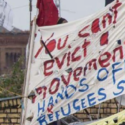
Network Conference: Solidarity Struggle During Corona Virus Time
On the 19-6 at 4pm in Mehringhöfe (Gneisenaustr 2a, 10961 Berlin) Blacks and whites together for human rights will conduct the conference about how was the struggle (each group’s struggle) during the Corona Virus and what was different in this time, how can we exchange the ideas to strengthen one another in our struggle on…
-
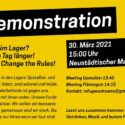
Leben im Lager? Keinen Tag länger! Demo in Brandenburg/Havel – 30/3, 15h
EN – FR – DE While the society has the chance to choose when and how they want to visit their loved ones in Corona times, the refugees living in camps have been unable to have any visits to their camps since the first wave of Corona. Visits with a negative Corona schnelltest are not…
-
Online-Flüchtlingstreffen – Einladung und Programm
von Karawane PDF البرنامج باللغة العربية | Programm als PDF (deutsch) | PDF برنامه به فارسی | program as PDF (english) | türkçe Program Seit einem Jahr gefährdet die Pandemie das Leben und die Existenz aller Menschen. Jedoch ist das Leben aller Menschen nicht in gleicher Weise und gleichermaßen erschwert. Tagtäglich geht die Schere zwischen Armen und Reichen auseinander. Die Regierungen interessieren sich…
-
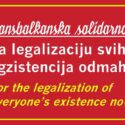
COVID-19: No one is safe until All are protected!
Open Letter from the Transbalkan Solidarity Group Currently there are tens of thousands of refugees and other migrants in the Balkans. Some of them are accommodated in official collective centers, while a large number of people fall outside the system, surviving through the help of the local population and support provided to them by volunteers…
-
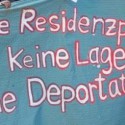
Conference on the Sudanese refugees’ situation in Germany (31 January at 21:00 on Skype)
Update 3 On 31/1/2021 at 21:00 we have a continuation of a workshop about Sudanese refugees from Schaumberg/Niedersachsen online to discuss the refugee’s situation. This is the 4th workshop now. We are not going to be silent, until the deportation is stopped, until the isolation of refugees is broken, and until the primary, secondary, and universal…
-
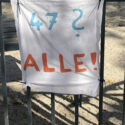
Ce qui se passe dans les camps en Grèce est une tragédie
de Ben / di Ben Italiano vedi sotto Il n’y a pas des mots pour décrire la souffrance des gens. Des femmes enceintes, des enfants petits, des malades se trouvent sans soutien dans des camps. Les conditions de vie ne sont pas imaginable. L’hygiène est impossible – comment respecter s’il n’y a ni du savon,…
-
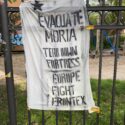
REFUGEES IN CORONA DAYS
This time, we publish our newspaper – which is the own voice of the refugee movement – as a special issue.
-
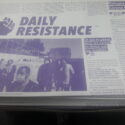
DR #7 published!
Update (10 August): The issue has been delivered and can now be picked up in Café Karanfil! You can also download and read a digital PDF version here: The issue consists of stories, statements and testimonies of people in isolated European lagers during Corona times. Languages of the texts this time: Turkish, Arabic, Urdu, Italian,…